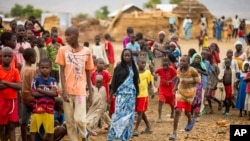Ahead of World Refugee Day on June 20, humanitarian agencies are distributing aid to the nearly 500,000 refugees who live in Cameroon. The U.N. refugee agency says another 400 Nigerians arrive every month in the country, which in addition to the refugees houses a million internally displaced persons. Despite the staggering numbers, UNHCR says it has received only 30% of the funds needed to help the refugees.
According to UNHCR, the number of refugees in Cameroon has increased to 479,000, up slightly from 2022.
Humanitarian agencies and aid groups have been distributing food aid and planting seeds for the refugees ahead of World Refugee Day on Tuesday.
About three-fourths of the refugees in Cameroon are from the Central African Republic, a country that has been rocked by violence since 2013, when a rebel group ousted then-President Francois Bozize, prompting reprisals.
Most of the other refugees in Cameroon are Nigerians displaced by Boko Haram militant attacks, with the majority living in the Minawao camp in northern Cameroon.
The refugees in Minawao elected Isaac Luka as their spokesperson. Luka fled Nigeria’s Borno state in June 2014 after Boko Haram extremists killed more than 20 people in his village.
Luka said it has not been easy for the United Nations and donor agencies to provide for the increasing number of refugees in Minawao.
"At first, UNHCR gave some subvention to take care of the health of the refugees,” he said. “The European Union gives us some money also to complete the unavailable medication in the hospital. Education is free in the camp, but 200 children in a classroom is not easy. Each refugee will have a card that you will go to any hospital in the country without paying."
Cameroon’s government says Minawao lies in an area where desertification is prevalent and water, food and natural resources are scarce.
Camp resident Esther Bongha from Nigeria said refugees at times run into conflicts with their host community members over scarce natural resources.
"I am managing to feed my children with the support of the World Food Program and UNHCR,” she said. “When we go to find firewood in the forest, the host community pursues us, and when we don't go to find firewood we are in problem (trouble)."
UNHCR says Minawao was built for 15,000 refugees but is now home to about 70,000.
Olivier Guillaume Beer, the UNHCR representative in Cameroon, said a majority of CAR and Nigerian refugees who fled to Cameroon lost everything in their countries of origin and need help.
But Beer said UNHCR received only about 30% of the $150 million it needed to take care of the refugees' humanitarian needs in 2022.
"We know that there are problems with refugees from Ukraine, that we have to meet the request of refugees from Afghanistan, from Sudan, but we would like to call on the donors to not forget Cameroon and to support Cameroon to support refugees,” he said. “When refugees are willing to repatriate, we will facilitate their return. What we are praying for is to have full peace so that all refugees will repatriate home."
Beer spoke on Cameroon state broadcaster CRTV on Monday.
Cameroon says a majority of the refugees it hosts do not want to return to the CAR or Nigeria.
However, last year, more than 4,000 Nigerians agreed to voluntarily return. Within the past 18 months about a thousand CAR refugees have returned to their country in a voluntary repatriation effort supervised by UNHCR.




